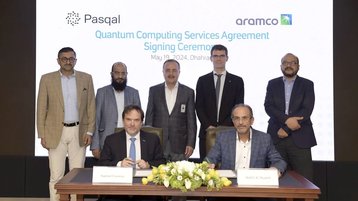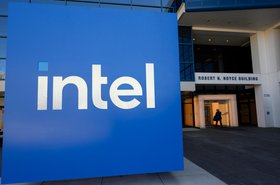Saudi oil company Aramco is partnering with French startup Pasqal to install the first quantum computer in Saudi Arabia.
Under the terms of the agreement, neutral atom quantum vendor Pasqal will install, maintain, and operate a 200-qubit quantum computer scheduled for deployment in the second half of 2025.
The Pasqal system will initially be deployed in analog mode, before being upgraded to a more advanced analog digital mode the following year in order to solve more complex problems.
In a statement, Aramco said it intends to use the quantum computer to “establish a powerhouse for quantum research within Saudi Arabia,” collaborating with academic institutions to advance quantum algorithm development.
“Aramco is delighted to partner with Pasqal to bring cutting-edge, high-performance quantum computing capabilities to the Kingdom,” said Ahmad Al-Khowaiter, Aramco EVP of technology and innovation.
“In a rapidly evolving digital landscape, we believe it is crucial to seize opportunities presented by new, impactful technologies, and we aim to pioneer the use of quantum computing in the energy sector. Our agreement with Pasqal allows us to harness the expertise of a leading player in this field, as we continue to build state-of-the-art solutions into our business. It is also further evidence of our contribution to the growth of the digital economy in Saudi Arabia.”
In 2022, Pasqal signed a memorandum of understanding with Aramco, pledging to collaborate on the development of quantum computing capabilities and applications in the energy sector. The following year, Pasqal opened an office in Saudi Arabia and received funding from Aramco during its Series B fundraising round.
State-owned Aramco is the world’s largest producer of oil and has rights to the world’s second-largest proven crude oil reserves. In 2017, a report by CDP and the Climate Accountability Institute found that Aramco was responsible for 4.5 percent of global industrial greenhouse gas emissions from 1988 to 2015, placing second to the country of China.
In 2021, the company partnered with Saudi Telecom Company to acquire a 55.4 petaflops Cray supercomputer, dubbed Dammam 7. Featuring Intel Xeon Gold 6248 CPUs, Nvidia Tesla V100 GPUs, and InfiniBand interconnection, the system is being used by Aramco to search for new fossil fuel reserves by processing large geophysical datasets.
Tech companies such as Google have previously been criticized by human rights groups for announcing plans to establish an operating base in Saudi Arabia.
Speaking in 2021 about Google’s data center and cloud region plans for the country, Rasha Abdul Rahim, director of Amnesty Tech, said: “Saudi Arabia has a dismal human rights record, including digital surveillance of dissidents, and is an unsafe country to host the Google Cloud Platform.”







